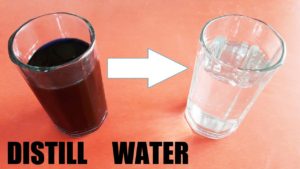
There are strongly opposing views on the issue of whether drinking distilled water instead of filtered, bottled or tap water is a safe, healthy and possibly even ideal option. Let’s look at the range of opinions, likely pros and cons, and some research data.
Blog Contents
An overview before we start
Distilled water was the first artificially-produced demineralised water. It was later followed by deionisation and reverse osmosis for achieving similar results. Initially used mainly for industrial, technical and laboratory purposes, these technologies were then used more in drinking water treatment from the 1960’s in certain arid and coastal areas, where highly mineralised brackish water or sea water represent almost the only water available. Ocean-going ships and spaceships also needed to produce/store demineralised water.
These water treatment methods were not used elsewhere because they were technically exacting and costly. However, nowadays, it’s possible to buy a bewildering range of counter-top water distillation and reverse osmosis machines that can be used in your own kitchen – and a whole industry has mushroomed selling, marketing and advocating the benefits of water distillation machines, as well as reverse osmosis machines (the latter of which we will not really touch on in this blog since it produces similar results to distillation).
But is drinking distilled water safer than, or even preferable to, drinking tap/bottled water in terms of the health claims made for it?
Range of opinions about drinking distilled water
There’s a really wide spectrum of opinion on this matter, ranging from those who consider it a total No No, like Dr Mercola 1 , who considers that you’ll die earlier if you drink it, through to the likes of Dr Joel Fuhrman and Dr Alan Goldhamer 2 who each consider it not only safe, but also ideal even during periods of prolonged water fasting for general detoxification, as well as for treating specific diseases, such as diabetes 3 . It’s worth pointing out that Dr Mercola has been repeatedly investigated by the FDA and been found guilty of unfounded and illegal claims for his products – perhaps not the best endorsement for a doctor’s opinion on anything 4 .
Drs Fuhrman and Goldhamer on the other hand have no such stains on their reputations and I would be happier to trust their opinions – especially when supported by peer-reviewed research data.
Dr Fuhrman’s opinion about drinking distilled water
In his book ‘Fasting and Eating for Health’, Dr Fuhrman mentions distilled water on two occasions and distilled spring water on one occasion:
- under the heading Rational Recommendations for a Healthy Society, he includes the following suggestion: “Drink purified or distilled water, not tap water, which contains chlorine.” 5
- under the heading What Should I Do During the Fast? he states the following: “During the fast one should drink at least I quart of pure water daily, and more if thirst demands. Chlorinated tap water should not be used. Most fasting establishments utilize distilled water for this purpose. I utilize distilled spring water because it is the purest water I can purchase and is totally free of chlorine.” 6
Dr Goldhamer’s opinion about drinking distilled water
Talking in a videoed interview about the the type of water recommended and used by the True North Health Center 7 while patients are undergoing water fasts, Dr Goldhamer says “We just want people to drink purified water. It doesn’t necessarily have to be steam-distilled, there’s also effective reverse osmosis. There are other systems of purification. What you don’t want is to get hydrocarbons, chlorine, toxic metals and parasites like Cryptosporidium and god knows what else that’s showing up in the municipal water systems…If we lived in a pure environment, the rain water would be distilled water, for example. It used to be that spring water could be counted on, but today we’ve done such a good job of polluting fresh and saltwater sources that no water can be guaranteed to be safe unless it’s purified effectively. The most effective purification system is steam distillation.” 8
Dr Michael Klaper’s opinion about drinking distilled water
Also regarding his work at the True North Health Center, and this time speaking on a podcast, Dr Klaper states: “We have a thirty gallon water distiller here. Everyone’s got distilled water available and there’s nothing purer than that…it’s distilled water used here. And we talk to them about the purest water they can get when they return home. It’s distilled water while they’re on the fast here.” 9
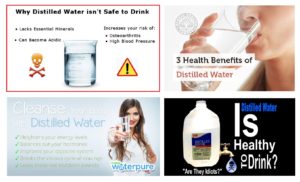
Pros and Cons of drinking distilled water
1. Distilling removes most chemicals, pollutants and toxins
A 2014 study 10 found that nitrite pollution in the tap water supply may cause baby birth defects such as cleft palate or missing limbs. Nitrites (and nitrates 11 are removed through distillation.
A 2013 study 12 found high levels of arsenic and barium in fresh drinking water sources. Both of which are removed through distillation.
A 2014 study 13 found that fungi and mycotoxins (their metabolites), which can prove carcinogenic, have been found in drinking water. Fungi and mycotoxins are removed through distillation
A 2018 study 14 found levels of PFOS 15 and PFOA 16 , which are often used in manufacturing, to be higher in drinking water than currently allowed by the U.S. Environmental Protection Agency. These chemicals, also known as polyfluoroalkyl and perfluoroalkyl substances or PFASs, have been linked to a myriad of a health problems, like thyroid disease, decreased fertility, high cholesterol, and hormone suppression. PFOA and PFOS are removed through distillation 17 .
A 2007 paper 18 found that copper in tap water may increase the risk of having Alzheimer’s Disease. Copper is removed through distillation.
A 2010 study 19 pointed out the dangers to human health (including causing high blood pressure and damage to the brain, nervous system and kidneys) that are posed by lead contamination of tap water. Lead is removed through distillation.
Summary of what can and cannot be removed through distillation
What can be removed?
In general, opinion appears to be similar to that expressed by NebGuide 20 : “Distillation can remove nearly all impurities from water. Compounds removed include sodium, hardness compounds such as calcium and magnesium, other dissolved solids (including iron and manganese), fluoride, and nitrate. Operated properly, [distillation] effectively inactivates microorganisms such as bacteria, viruses, and protozoan cysts..Distillation also can remove many organic compounds, heavy metals (such as lead), chlorine, chloramines, and radionucleides…Distillation can remove nearly all impurities from water. Compounds removed include sodium, hardness compounds such as calcium and magnesium, other dissolved solids (including iron and manganese), fluoride, and nitrate. Operated properly, it effectively inactivates microorganisms such as bacteria, viruses, and protozoan cysts.”
What cannot be removed?
Again, quoting from the above NebGuide source: “Removal of organic compounds by distillation can vary depending on chemical properties of the contaminant. Certain pesticides, volatile solvents, and volatile organic compounds (VOCs) 21 , such as benzene and toluene, with boiling points close to or below that of water will vaporize along with the water as it is boiled in the distiller. Such compounds will not be completely removed unless another process is used prior to condensation.” However, a water distiller that has an added carbon filter will remove these VOCs 22 23 , and there are water distillers with a preheating phase that can remove these inorganic chemicals, although you will have to pay more for these models.
There are some internet sites which go into a lot more detail on VOCs if you are interested. One that looks in some detail at potential VOCs in the home can be found at LAHomes.com.
It’s also useful to note that the boiling process during distillation will generally remove all microorganisms. However, if the distiller is idle for an extended period, bacteria can be reintroduced from the outlet spigot and may recontaminate the water.
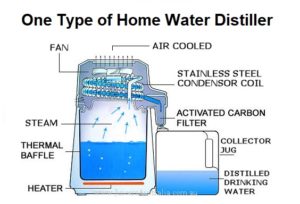
Is chlorine removed through distillation?
Opinions seem to differ on whether chlorine is removed through distillation. The reason for this appears to rest in the fact that chlorine has a lower boiling point than water, so it’s not necessarily removed in all types of water distillation machines – whether industrial or counter-top varieties. However, as a rule of thumb, if you are considering buying a home water distiller, it’s worth checking whether or not it has the added ability to filter out chlorine (as well as VOCs).
One organisation promoted its water distiller’s ability to remove chlorine as follows:
“…distillation is extremely effective in removing contaminants that have a higher boiling point than water, which is the vast majority of contaminants. There are some inorganic and organic chemicals that have a lower boiling point than water, such as chlorine. We handle this in two ways…First, our distillers incorporate twin volatile gas vents, a patented feature. These are two small holes that allow gases that are lighter than air, such as chlorine to harmlessly vent out. Second, all of our water distillers incorporate carbon filters, which are very effective at removing these gases that still happen to be present. We have tested the effectiveness of our machines on chlorine with and without a carbon filter. Without a carbon filter we achieved a 93% to 95% removal rate of chlorine. With the carbon filter we achieved a 99% plus (which means that no chlorine was detected).” 24
You may be interested in reading more about some of the worst cases of mass contamination of drinking water: “11 Insanely Terrible Water Contamination Disasters in History.” 25 .
2. Distilling is arguably the most natural water purification method
Distillation is a process that first boils water. The unwanted chemicals and minerals are left in liquid state, while the pure water is converted to steam. Then it is converted back to water by condensation, a process that’s similar to evaporation in Earth’s natural water cycle 26 .
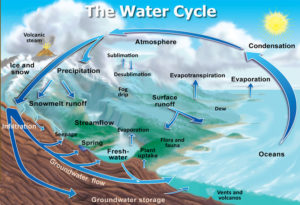
There’s an interesting article 27 that covers most of the alternative water filtration/purification methods available, including:
- Chlorination
- Filtration
- Sediment filtration
- Activated carbon filtration
- Slow Sand filtration
- Sand filters
- Fast Sand filtration
- Settling
- DE (diatomaceous earth) filtration
- Microfiltration, ultrafiltration and nanofiltration
- Distillation
- Reverse osmosis
- Ultraviolet irradiation
- Ion exchange resins
- Acid neutralisation
- Water softening
- Aeration
- Boiling
- Ozonization
- Flocculation
- Constructed wetlands
3. Distilled water is regarded as the purest form of water
Distilled water is used in a wide range of industries and organisations that require the purest form of water: laboratories, industry, medicine, perfumes, and food processing. Although there may also be additional purification methods used in addition to distillation (such as filtering and reverse osmosis 28 ), there’s no doubting its effectiveness in purifying water.
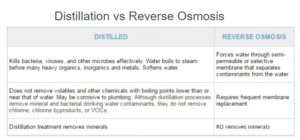
4. Distillation safely removes fluoride
Not all water companies around the UK add fluoride to tap water, but around 10% of the UK population have fluoride added, as of 2015 29 , whilst around 61.5% of the total U.S. population, as of 2008, have fluoride in their tap water 30 . Fluoride in tap water is a contentious issue. Suffice to say, however, that distillation is effective in removing almost all fluoride 31 , although reverse osmosis is apparently even more effective 32 .
5. Distilled water prevents water-borne diseases
Parasites and bacteria in drinking water can caused a number of potentially fatal water-borne diseases 33 . It appears that all of these pathogens can be removed through the distillation process 34 35 .
If you are interested in reading more about the most dangerous water-borne diseases, All About Water Filters website 36 provides an informative list.
6. Distilled water absorbs and eliminates toxic substances from the body
Distilled water effectively removes dangerous toxins and poisons from the body. This is one of the reasons that it is widely used during water fasts in order to optimally detoxify the body at a cellular level. The kidneys are perfectly capable of maintaining a balance of minerals and will prevent required amounts from leaching out in the urine.
There’s a common misunderstanding that we all need the minerals and salts that can be contained in tap water. In fact, if you are eating a balanced and healthy diet (ideally WFPB) then you get all the minerals and salts you need from food.
7. Less expensive than spring/bottled water
Distilled water (especially when produced in your own home water distiller) is significantly cheaper than spring or bottled water. It’s also important to note that there have been and probably continue to be some worrying revelations about the contaminants in spring/bottled water – with several cases where tap water and even polluted ground water have been sold as spring water.
There is some debate about spring vs distilled water. This is largely based on the fact that there’s a taste difference between the two, with distilled water tasting ‘flat’ in comparison.
A 2016 study by the Natural Resources Defense Council 37 found a wide range of contaminants in bottled spring water (such as coliform, arsenic and phthalates). It’s to be remembered that spring water is likely to contain most of the same impurities carried in well water or tap water. Certainly in the U.S., various commercially-available brands of spring water may only be processed slightly to pass safety regulations. However, commercially-bought distilled water has to undergo the process of distillation before being marketed, so that every bottle is sure to be distilled. 38
8. Cooking and distilled water
As well as being drunk, distilled water is advocated by some for use in making soups, beverages and even exclusively for all cooking purposes. However, opinions do differ on this issue.
In coffee makers, it’s claimed that distilled water might mean you don’t have such a problem with cleaning, since there will be minimal or no mineral deposits to get rid of. However, others say that it results in a very inferior tasting coffee 39 .
Making soup using distilled water is thought by some to be an excellent idea because of the fact that distilled water is very ‘soft’ 40 , due to the absence of minerals – thus able to very aggressively absorb other minerals in the food within the soup mix. This is not such a bad thing, since the the water will also be consumed along with the food ingredients.
Boiling/steaming vegetables is clearly, therefore, a somewhat different matter. The fact that distilled water draws out minerals from food would mean that if the food is eaten without the water, then there’s going to be a reduction in the amount of minerals remaining in the food compared with boiling/steaming in plain tap water (which will be ‘harder’ 41 ). For decades, studies 42 43 have focused on the potential health issues related to using hard – mineralised – water for cooking, rather than soft – demineralised – water, whether it was demineralised through deionisation 44 , distillation or reverse osmosis. Particular concern was the removal of calcium. magnesium and potassium from the water since this might be linked to increased cardiovascular mortality rates.
Admittedly, if you are eating an optimally healthy diet (have a look at a recent blog 45 if you are interested in completing a brief interactive survey about whether you are doing so), then you will be getting ample minerals and other nutrients from your food without having to worry too much about the hardness or softness of your tap water. However, the decision whether to use distilled water for boiling/steaming vegetables would, I suppose, depend on whether you were intending to also drink/use the resulting re-mineralised water.
Boiling rice in distilled water should, one would think, thereby stand a good chance of removing more of the arsenic that we know is in much of the rice sold around the world 46 47 .
As an aside, it’s not wise to cook with distilled water when using aluminium pots and pans.
9. The taste of distilled water
There’s no denying that distilled water is widely criticised for its ‘flat’ taste:
“Distilled water has poor taste characteristics.” 48
Since the distilled water has had the minerals removed, the balance of ions on your tongue is upset, resulting in an unfamiliar taste sensation. Dr Fuhrman and others state that one gets used to its taste (or lack of taste?) within a number of days.
One website claims the following: “shop-bought distilled water has been sitting in warehouses and store shelves for weeks, and thus develops this flat taste. However, this is not the case when distilled water is made fresh at home. There’s no “taste” at all because there isn’t anything in the water to taste in the first place. Nothing can “taste” as clean and pure as distilled water when it’s made fresh and stored appropriately for future use.” 49
10. Speed/energy efficiency of water distillation
Any search on the internet 50 51 will quickly reveal that there are a wide range of counter-top models available, but they all tend to take a relatively slow time in producing the end product. There are electric, non-electric and solar powered versions available. You could argue that a possible negative, in any event, is that you’re creating more carbon emissions when you spend energy and resources on distilling your water, but is buying commercially-produced distilled water in plastic bottles any better?
11. The cost of water distillers
Depending on the size of your budget and the level of purity and speed of output that you want, there’s a wide range of prices. There are many websites 52 53 54 that publish in-depth reviews of different classes of water distillers.
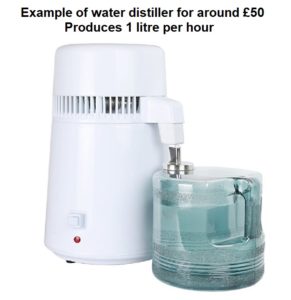
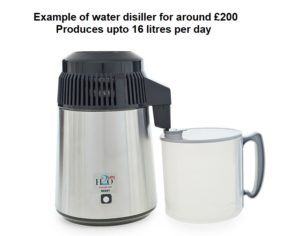
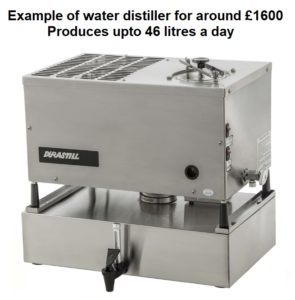
12. Distilled water and body acidity
Once again, opinions differ on this issue, ranging from those who consider the slight acidity (a pH of around 6, compared with the neutral of 7) of distilled water will cause the body to become acidic and result in the condition known as acidosis 55 , through to those who consider that the acidity of distilled water is neutralised before it’s even absorbed by the body.
Acidosis is a very rare condition and is only recorded in extreme cases where a person has been drinking only distilled water for a long period and does not get proper nutrition. There are also cases 56 reported of infants developing acidosis and brain oedemas when all their drinks have been prepared with distilled or low-mineral distilled water.
An in-depth study by the World Health Organisation 57 suggests that both hyponatremia (critically low blood serum levels of sodium – less than 135 mmol/L) and hypokalemia (critically low blood serum levels of potassium – less than 3.5 mmol/L) may be associated with drinking very large quantities of distilled water, or drinking it solely over a very long period of time. Once again, this is assuming that the rest of the diet is deficient in these two minerals. Interestingly, various other studies 58 59 60 61 that looked at the specific causes of these two conditions make no mention at all of distilled water as a potential cause. Distilled water would have been expected to appear as a causal agent in such studies since its consumption is thought to reduce the levels of sodium and potassium in the body.
I suspect that the reason these conditions (as with distilled-water-consumption-induced acidosis) are not generally listed in such studies is because most people, certainly in the developed world, eat a diet with probably too much sodium and, if potassium levels are found to be low, which might happen with a high-animal/low-plant food diet, the culprit is much more likely to be poor diet than the amount of distilled water consumed.
The usual causes of hypokalemia include:
- loss in urine due to prescription medications (water pills or diuretics)
- excess vomiting (through illness or condition like bulimia 62 ) *
- diarrhoea
- low dietary potassium content (diets low in fruit and veg/high in animal and processed foods)
- excessive alcohol use
- chronic kidney disease
- diabetic ketoacidosis 63
- excessive laxative use
- excessive sweating
- folic acid deficiency
- primary aldosteronism 64
- some antibiotic use 65
* A useful guide for how to stop binge eating in three easy steps has been written by Glenn Livingston Ph.D. and is available here 66 .
Hypomagnesemia (critically low levels of blood serum magnesium – less than 1.25 mg/dL) has also been of concern to researchers 67 . if ther – is insufficient in the diet or if too much is removed through any cause, including its removal through the distillation process.
The usual causes of hypomagnesemia include:
- excessive alcohol use
- burns that affect a large area of the body
- chronic diarrhoea
- excessive urination (polyuria), such as in uncontrolled diabetes and during recovery from acute kidney failure
- high blood calcium level (hypercalcemia)
- hyperaldosteronism (disorder in which the adrenal gland releases too much of the hormone aldosterone into the blood)
- malabsorption syndromes, such as coeliac disease and inflammatory bowel disease
- malnutrition
- medicines including amphotericin, cisplatin, cyclosporine, diuretics, proton pump inhibitors, and aminoglycoside antibiotics
- sweating 68
An additional point is worth making on this matter: a high acid diet is one which is animal-based 69 . A non-SOS WFPBD (non added sugar, oil or salt wholefood plant-based diet) will always be alkaline, low in sodium and high in potassium. And you can probably guess what sort of diet most people eating the SAD (standard American diet) consume when it’s reported that 98% of Americans are deficient in potassium 70 . For people eating such a diet, it would be more advisable to increase the fruits and veg and decrease the animal and processed foods – a far better solution than simply drinking distilled water to try and detoxify and demineralise their already toxic and mineral-deficient bodies.
13. Distilled water can dissolve containers
It’s possible that this might affect the taste of commercially-bought distilled water which generally comes in low grade plastic containers, since the water may act as a solvent and partially dissolve these water bottles given the right circumstances. It’s best to store in glass or stainless steel. Interestingly. distilled water is also known to corrode copper pipes 71 .
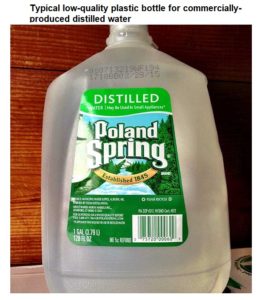
14. Distilled water is unnatural
This is an interesting argument against distilled water, and it’s usually made by companies that sell spring water, unsurprisingly enough. Whilst there is an element of truth in this contention, it might also be argued that the reason we even consider using purified water (whether via distillation or other techniques) is because humans have been so effective at polluting almost all the fresh and salt water on our planet.
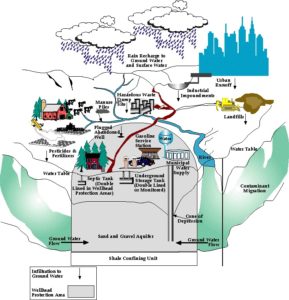
15. Is constant consumption of distilled water safe?
This is, perhaps, the most crucial question that needs addressing. I have no doubt that there are benefits of drinking distilled water during a short water fast (I’m doing one at this moment, as it happens) and during the type of longer medically-supervised water fasts used by Dr Goldhamer et al. However, what about drinking it all the time? One study, 67 looking specifically at the use of demineralised water from desalination plants for use with the armed services, considers that it’s not a good idea to consume demineralised water for long periods of time. They prefer chlorination as a process of purification against potential water-borne pathogens.
A health report under the auspices of the World Health Organisation by the National Institute of Public Health in the Czech Republic 72 make some rather thought-provoking comments about the consumption of demineralised water:
“…regular consumption [of demineralised water] may not be providing adequate levels of some beneficial nutrients. Sufficient evidence is now available to confirm the health consequences from drinking water deficient in calcium or magnesium. Many studies show that higher water magnesium is related to decreased risks for CVD (cardiovascular disease) and especially for sudden death from CVD. This relationship has been independently described in epidemiological studies with different study designs, performed in different areas, different populations, and at different times. The consistent epidemiological observations are supported by the data from autopsy, clinical, and animal studies. Biological plausibility for a protective effect of magnesium is substantial, but the specificity is less evident due to the multifactorial aetiology of CVD. In addition to an increased risk of sudden death, it has been suggested that intake of water low in magnesium may be associated with a higher risk of motor neuronal disease, pregnancy disorders (so-called preeclampsia), sudden death in infants, and some types of cancer. Recent studies suggest that the intake of soft water, i.e. water low in calcium, is associated with a higher risk of fracture in children, certain neurodegenerative diseases, pre-term birth and low weight at birth and some types of cancer.”
Joe’s conclusions
This can appear to be pretty scary stuff, especially for those who eat a mineral-poor diet, who decide to drink only distilled – or otherwise demineralised – water.
For those on a healthy, mineral-rich diet (i.e. people who do not rely on tap water to provide such minerals as chlorine, calcium, magnesium and potassium) my opinion is somewhat different. There’s nothing I have yet come across in the research literature that would lead me to worry about any healthy adult – who is not on medication and who eats an optimal WFPB diet – from drinking distilled water while they are on a short-term or planned/medically supervised long-term fast.
Additionally, I can’t see any great concern for any such individuals who wish to use distilled or otherwise demineralised water in combination with a WFPB diet so long as they have their blood mineral levels tested on an annual or bi-annual basis, as I would suggest in any case for anyone interested in maintaining optimal health.
However, for those who are not eating a WFPB diet, I would not recommend drinking distilled water in place of tap water – particularly in countries or regions that have high levels of purity in their tap water (something that you can find out by going to the website of your local water provider).
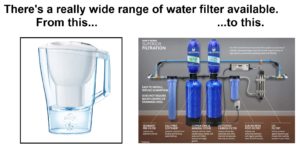
If you decide not to use water distillation, it’s always worth considering buying some form of water filter for your tap water. You can find lots of websites reviews 73 74 75 on standard non-demineralising water filters, including those that can be plumbed into your tap water system 76 .
Additional advice on distilled water is available from Medical News Today 77 , Helathline 78 , Researchgate 79 , All About Water Filters 80 and elsewhere.

If in doubt – research it…
References
- Dr Mercola: Early Death Comes From Drinking Distilled Water [↩]
- Integr Med (Encinitas). 2014 Jun; 13(3): 52–57. Alan Goldhamer, dc: Water Fasting—The Clinical Effectiveness of Rebooting Your Body. Craig Gustafson. [↩]
- Conservative Management of Diabetes. October 15, 2013. By Alan Goldhamer, D.C. [↩]
- Quackwatch: Dr. Joseph Mercola Ordered to Stop Illegal Claims. Stephen Barrett, M.D. [↩]
- Fuhrman, Dr. Joel. Fasting and Eating for Health: A Medical Doctor’s Program For Conquering Disease (p. 53). . Kindle Edition. [↩]
- Fuhrman, Dr. Joel. Fasting and Eating for Health: A Medical Doctor’s Program For Conquering Disease (p. 218). . Kindle Edition. [↩]
- True North Helath Center: Water Fasting. [↩]
- Dr Goldhamer: Safe 40-Day Water Fasting Fasts And The Traits Vital People Share. YouTube Video: 49 mins 29 seconds in. [↩]
- Vidal Speaks. JANUARY 25, 2017. Dr. Michael Klaper: Water Fasting for Better Health – Episode 54. [↩]
- Drinking Water Problems: Nitrates. Posted on June 12, 2014 by Texas A&M AgriLife Extension Source: Texas A&M AgriLife Extension Service [↩]
- water-research.net: Nitrates and Nitrites in Drinking Water Groundwater and Surface Waters. Written by Mr. Brian Oram, PG [↩]
- Comparison of Barium and Arsenic Concentrations in Well Drinking Water and in Human Body Samples and a Novel Remediation System for These Elements in Well Drinking Water. Kato M, Kumasaka MY, Ohnuma S, Furuta A, Kato Y, Shekhar HU, Kojima M, Koike Y, Dinh Thang N, Ohgami N, Ly TB, Jia X, Yetti H, Naito H, Ichihara G, Yajima I. PLoS One. 2013 Jun 21;8(6):e66681. doi: 10.1371/journal.pone.0066681. Print 2013. [↩]
- Fungi contamination of drinking water. Al-Gabr HM, Zheng T, Yu X. Rev Environ Contam Toxicol. 2014;228:121-39. doi: 10.1007/978-3-319-01619-1_6. Review. PMID: 24162095. [↩]
- Toxicological Profile for Perfluoroalkyls. Draft for Public Comment. June 2018. [↩]
- Wikipedia: PFOS – Perfluorooctanesulfonic acid [↩]
- Wikipedia: PFOA – Perfluorooctanoic acid [↩]
- THE REMOVAL OF POLY- AND PERFLUOROALKYL
SUBSTANCES BY NORTH AMERICAN WATER TREATMENT PRACTICES by Timothy D. Appleman, 2012. [↩] - URMC / News / Copper Damages Protein that Defends Against Alzheimer’s. Wednesday, November 07, 2007. Published by University of Rochester Medical Center. [↩]
- DRINKING WATER INSPECTORATE. Lead in drinking water. [↩]
- NebGuide. Nebraska Extension. Drinking Water Treatment: Distillation. Bruce I. Dvorak, Extension Environmental Engineering Specialist
Sharon O. Skipton, Extension Water Quality Educator. Revised 2013 [↩] - Wikipedia: VOC – Volatile Organic Compounds [↩]
- Environ Technol. 2005 Jul;26(7):757-66. Performance of activated carbon loaded fibrous filters on simultaneous removal of particulate and gaseous pollutants. Agranovski IE, Moustafa S, Braddock RD. [↩]
- steamdistiller.com: Distiller Owner FAQs .Do I need to use charcoal filters with my water distiller? [↩]
- QUESTION: HOW DOES DISTILLATION REMOVE CHEMICALS SUCH AS CHLORINE? WON’T CHLORINE AND OTHER HARMFUL CHEMICALS SIMPLY VAPORIZE WITH THE WATER VAPOR? HOW THEN DOES THE DISTILLER SEPARATE THE CHLORINE VAPOR FROM THE WATER VAPOR? Published on October 11, 2010 by MyPureWater. [↩]
- All About Water Filters: 11 Insanely Terrible Water Contamination Disasters in History. [↩]
- Wikipedia: Water Cycle. [↩]
- Apps Laboratories Water Doctor: Guide to water treatment and filtration. [↩]
- Puretec: What is Reverse Osmosis? [↩]
- The Telegraph: The extent of water fluoridation in the UK. 24 Feb 2015. [↩]
- Division of Oral Health, National Center for Chronic Disease Prevention and Health Promotion, CDC (September 17, 2008). “Water fluoridation statistics for 2006”. Retrieved December 22, 2008. [↩]
- Environ Sci Pollut Res Int. 2014 Sep;21(17):10493-501. doi: 10.1007/s11356-014-2858-z. Epub 2014 Apr 23. Fluoride removal from aqueous solution by direct contact membrane distillation: theoretical and experimental studies. Boubakri A1 Bouchrit R, Hafiane A, Bouguecha SA. [↩]
- J Indian Soc Pedod Prev Dent. 2008 Mar;26(1):6-11. The effect of water purification systems on fluoride content of drinking water.
Prabhakar AR, Raju OS, Kurthukoti AJ, Vishwas TD. [↩] - Centers for Disease Control and Prevention: Water-related Diseases and Contaminants in Public Water Systems. [↩]
- Water Health Series: Filtration Facts, EPA816-K-05-002; September, 2005 [↩]
- FEMA and American Red Cross Recommendations for Treating Water in an Emergency. July 2, 2017 [↩]
- All About Water Filters: 25 Dangerous Water Borne Diseases We Need To Fight Now [↩]
- The Truth About Tap. Lots of people think drinking bottled water is safer. Is it? January 05, 2016 Andrew Postman [↩]
- Drink More Water: We Set the Standard for Purity. Types of water. [↩]
- Cook’s Info: Distilled Water. [↩]
- Wikipedia: Soft Water. [↩]
- Wikipedia: Hard Water. [↩]
- Health Effects of the Removal of Substances Occurring Naturally
in Drinking-water, with Special Reference to Demineralized and Desalinated Water. EURO Reports and Studies 16. March 1978. [↩] - Arch Environ Health. 1981 Jan-Feb;36(1):33-5. Changes in the mineral composition of food as a result of cooking in “hard” and “soft” waters. Haring BS, Van Delft W. [↩]
- Wikipedia: Capacitive deionization. [↩]
- Take the 4Leaf Survey [↩]
- How to Cook Rice to Lower Arsenic Levels
Michael Greger M.D. FACLM July 31st, 2017 Volume 37. [↩] - Scientific American: Simple Cooking Method Flushes Arsenic out of Rice [↩]
- WHO Library Cataloguing-in-Publication Data. Nutrients in drinking water. 1. Water supply. 2. Potable water. 3. Water treatment. 4. Nutrition. 5. Micronutrients. I. World Health Organization. ISBN 92 4 159398 9 . 2005. p149. [↩]
- h2olabs.co.uk Fiction: “Distilled water tastes flat.” [↩]
- Best Water Distiller – Buyer’s Guide. Updated: June 21, 2018 By Beth Beck. [↩]
- Amazon.co.uk water distillers. [↩]
- Water Filter Magazine: The 6 Best Water Distillers – (Reviews & Definitive Buyer’s Guide 2018) April 1, 2018. [↩]
- iwaterpurification: Reviews of The Best Water Distillers of 2018 [↩]
- foodsharkmarfa: Top 9 Best Water Distillers Reviews in 2018 [↩]
- Wikipedia: Acidosis. [↩]
- FNB, Food Nutrition Board, Institute of Medicine. Dietary reference intakes for water, potassium, sodium, chloride, and sulphate. ashington, D.C.: The National Academies. Press, 2003. [↩]
- WHO Library Cataloguing-in-Publication Data. Nutrients in drinking water. 1. Water supply. 2. Potable water. 3. Water treatment. 4. Nutrition. 5. Micronutrients. I. World Health Organization. ISBN 92 4 159398 9 . 2005. [↩]
- Ann Pharmacother. 2003 Nov;37(11):1694-702. Causes and management of hyponatremia. Palmer BF1, Gates JR, Lader M. [↩]
- BMC Med. 2014; 12: 1. Diagnosis and treatment of hyponatremia: a systematic review of clinical practice guidelines and consensus statements. Evi V Nagler,corresponding author Jill Vanmassenhove, Sabine N van der Veer, Ionut Nistor, Wim Van Biesen, Angela C Webster, and Raymond Vanholder. [↩]
- Hypokalemia-Consequences Causes, and Correction. jasn.asnjournals.org/content/8/7/1179.full.pdf. [↩]
- Pathophysiology and management of hypokalemia: a clinical perspective. Unwin RJ, Luft FC, Shirley DG. Nat Rev Nephrol. 2011 Feb;7(2):75-84. doi: 10.1038/nrneph.2010.175. Review. PMID: 21278718. [↩]
- NHS: Bulimia. [↩]
- NHS: Diabetic ketoacidosis. [↩]
- Mayo Clinic: Primary aldosteronism. [↩]
- Mayo Clinic: Low potassium (hypokalemia [↩]
- How to Stop Binge Eating in Three Unusual Steps – A weird but systematic way to stop overeating and binge eating. Glen Livingston. [↩]
- Med J Armed Forces India. 2014 Oct; 70(4): 377–379. Published online 2014 Mar 6. doi: 10.1016/j.mjafi.2013.11.011. PMCID: PMC4223198. PMID: 25382914. Demineralization of drinking water: Is it prudent? K.C. Verma, Cola and A.S. Kushwaha. [↩] [↩]
- Medline Plus: Low magnesium level. [↩]
- nutritionfacts: Acid/base Balance [↩]
- 98% of American Diets Potassium-Deficient. Michael Greger M.D. FACLM December 19th, 2012 Volume 11 [↩]
- Report number: 2013:07 ISSN: 2000-0456. Available at www.stralsakerhetsmyndigheten.se. Corrosion of copper in distilled water without molecular oxygen and the detection of produced hydrogen. [↩]
- HEALTH RISKS FROM DRINKING DEMINERALISED WATER. Frantisek Kozisek. National Institute of Public Health Czech Republic. [↩]
- The Independent: 8 best water filter jugs. Get healthy and hydrated by filtering out all the bad stuff. Stacey Smith. Thursday 28 June 2018. [↩]
- Tapp Water: Best Drinking Water Filters 2018
1 March, 2018 Erik [↩] - Evening Standard: Best water filter jugs and attachments 2018. From pesticides to fluorides, these purifying gadgets can keep the nasties away from your H2O. Friday 16 March 2018. [↩]
- designrhome.com: Best 10 Purified Water Filtration Taps For Healthy Water. [↩]
- MedicalNewsToday: Can you drink distilled water safely? Last reviewed Tue 30 May 2017 By Jenna Fletcher Reviewed by Natalie Butler, RD, LD [↩]
- Healthline: Can You Drink Distilled Water? [↩]
- Is drinking distilled water safe? – ResearchGate [↩]
- All-About-Water-Filters: 20 Benefits and Dangers of Drinking Distilled Water Regularly [↩]
